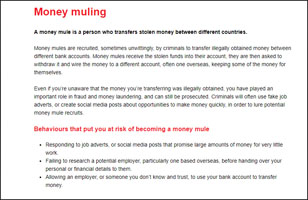Money Mulling Scams
Guard against money mulling scams that lure victims with false promises of quick riches. Understand the tactics used in financial scams, fraudulent schemes, and online deceptions to protect yourself from falling prey to money laundering scams.
Scammers have inflicted immense financial losses, amounting to billions of dollars, upon both corporate entities and individuals. Unverified estimates and statistics underscore the alarming reality that insurance companies have suffered substantial financial setbacks due to scams, prompting intensified efforts to curb such fraudulent activities. Operating either individually or in organized groups, scammers exploit unsuspecting individuals, orchestrating various schemes to siphon funds. In the current digital landscape, a proliferation of online scams poses a significant threat, especially for those engaging in financial transactions protected by login passwords. Scammers aggressively promote deceptive schemes, coercing the public to invest in fictitious ventures. Once funds are invested, these scammers vanish, leaving victims empty-handed.
Money Muling Scam Awareness
One of the emerging global scams is "money mulling," particularly targeting unemployed or underemployed individuals. Caution is advised against responding to phishing emails from scammers. Intermediaries involved in money mule scams attempt to extract funds from unsuspecting individuals, transferring them to the scamming network while keeping a portion for personal expenses. Citizens receiving job offers from foreign countries should exercise extreme vigilance and conduct thorough background checks before engaging. If any suspicion arises, recipients are urged to promptly report such incidents to the relevant authorities. Following these tips can help the public safeguard their finances.
- Always conduct a background verification check when receiving unsolicited job offers or communications from recruitment firms.
- Be cautious of emails from scammers that may appear official with logos but contain numerous grammatical errors.
- Refrain from sharing personal or financial information with third parties.
- Report such crimes or scams to the police or relevant government authorities promptly.
Stay Safe: Understanding the Threat of Money Muling Scams
Transferring money through legitimate channels is a straightforward process, but recovering funds from scammers becomes nearly impossible as they swiftly vanish with the money. Surprisingly, a significant number of people lack awareness about money mule and recruitment scams. Individuals who frequently use the internet should regularly read articles on scams to stay informed. Ignorance poses a serious risk, as scammers specifically target innocent and uninformed individuals. Companies or intermediaries offering jobs should be registered entities, prompting recipients of employment emails to thoroughly verify the credentials of these entities. It is crucial to recognize that approaches to become a money mule often come from strangers, and many fail to grasp the severity of such involvement. Scammers initially use phishing emails, resorting to alternative tactics if unsuccessful. It is essential not to succumb to the deceptive words of scammers and to exercise critical thinking before depositing money into dubious schemes.
Money Muling Scams: Staying Informed and Protected
Money muling scams have become a rampant threat, and it's crucial to be aware and vigilant. Here are key points to protect yourself:
1.Recognize Phishing Mails:
Be wary of unsolicited job offers or emails from recruitment firms.
Scammer emails often look official but contain numerous grammatical errors.
2.Guard Personal and Financial Information:
Never share personal or financial details with third parties.
Legitimate employers will not ask for sensitive information via email.
3.Background Verification:
Always perform background checks on job offers and companies.
Verify the credentials of companies offering employment to ensure legitimacy.
4.Escalate to Authorities:
Report any suspicious activity to the police or relevant government authorities.
Timely reporting can prevent others from falling victim to the same scams.
5.Understanding Money Mule Tactics:
Scammers may entice individuals with colorful, official-looking emails.
Recognize the seriousness of becoming a money mule and avoid such involvement.
6.Educate Yourself:
Stay informed about scams by regularly reading articles and updates.
Knowledge is a powerful defense against falling victim to scams.
7.Verify Company Credentials:
Ensure that companies or intermediaries offering jobs are registered entities.
A legitimate employer will have a traceable and verifiable presence.
8.Beware of Financial Transactions:
Transferring money through proper channels is secure, but caution is crucial.
Once scammers obtain funds, recovery becomes extremely challenging.
9.Avoid Ignorance:
Ignorance makes individuals susceptible to scams.
Regularly educate yourself about prevalent scams to stay ahead.
10.Think Wisely:
Exercise critical thinking before depositing money into any schemes.
Question the legitimacy of any transaction that seems too good to be true.
By staying informed and following these guidelines, you can fortify yourself against the rising tide of money muling scams. Vigilance is your best defense in the evolving landscape of online threats.





